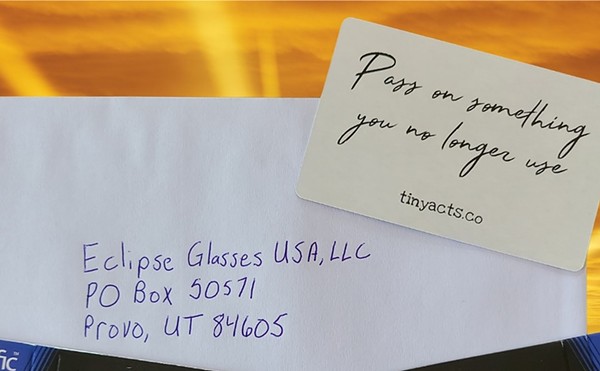
Using Louisville as her base for a month, Yody has traveled the country explaining the tangible difference fair trade has made in her life and the lives of women in her community in Huancavelica, Peru.
Fair trade, wherein people — artisans, farmers and factory workers, among others — are paid equitably for their work, is an alarmingly unfamiliar concept to most Americans, even though we live with a national minimum wage that is clearly insufficient to most everyone but those who pay it. It is often confused with “free trade,” which has a lot more to do with lowering wages in the name of competition than maintaining them in the name of, well, human decency.
The idea is simple enough: People should be paid with consideration for things like time, materials, market demand and living wage. Total transparency is also important, so that producers know what becomes of their products from the time they leave their hands to the point of sale a continent away, and how much money is involved. That is the key.
For a group of Peruvian women who have lived through years of terrorism (government-sponsored and otherwise), and now face a stumbling economy that is once again inciting violence, our willingness to understand and embrace fair trade can mean the difference between their struggle and success.
Before Louisville native Ruth Farrell introduced her to fair trade through the Presbyterian Church’s Peacemakers program, Moran said money was hard to come by. She and her husband would leave their children with family members four or five days a week to retrieve llamas from a small family farm in the mountains and walk them to Lima. After the five-hour commute on foot through formidable terrain, she may or may not have earned any money for the skinny livestock.

Mainstream business news lately is focused on an expanding global economy, the “biggest economic updraft in history,” where exorbitant wealth at the top is said to be lifting up billions of people making up the bottom. At the same time, poor people generate much of that wealth, creating our sweaters, shoes and stylish home décor without making enough money to sustain their families, let alone save or plan for a future.
Few Louisville stores sell fair trade products, and only two have made it a central part of their operations. Yody saw her work for the first time last week at Just Creations on Frankfort Avenue.
“It was incredibly emotional,” she said.
Selling functional and fun crafts from India, Indonesia, Ghana and other countries, Just Creations has been a nonprofit dedicated to educating Louisville about fair trade for 14 years. Still, it’s not a message people tend to take to heart immediately, says executive director Joan Frisz. Only after people are drawn to something there do they become open to the message.
“We haven’t found a lot of success trying to market the mission as such,” said Frisz. “It’s been more powerful actually to market the products and tell the stories along with it.
“I think (Americans) can hear the ‘people are being exploited’ message, but it doesn’t necessarily move them to action. Well, we’ve already taken the action.”
So has Heine Brothers’ coffee, whose owners decided in 2002 that they had no good reason not to sell only organic, fair trade coffee — some of their stock held the designation for years before. Since joining the 22-member Cooperative Coffees group, owners Gary Heine and Mike Mays have seen the effects of their buying decisions around the world. Heine recently visited an Ethiopian village where residents proudly showed off two schools built with coffee profits, generated in part by Louisville consumers.
Despite the dramatic positive effects fair trade can have — Moran and her coworkers have more than doubled their incomes within a year — the concept is largely ignored among economists, even as some tout our global interconnectedness. There is no room for fair trade in the dominant, capitalist economic system; it’s been completely left out of the economic lexicon.
To Dr. Babu Nahata, a professor of economics at the University of Louisville, the word “fair” implies a value judgment that economic theory cannot define. He said it would take nothing short of messianic reappearance for companies to voluntarily factor issues such as living wages into their decisions. That, or dramatic consumer demand.
Moran said even though she’s found Americans to be kind people interested in her story, she doesn’t believe the majority usually make the connection between the clothing they wear and the people who produced it, probably thousands of miles away. Yet she cannot stress enough the difference it would make if they did. Her cooperative has saved $1,000, three months worth of profits, almost enough to buy a machine that will make sweaters they can customize by hand.
Heine and Mays said they have no illusions of saving the world through fair trade coffee. It’s simply part of an equation that should include changes in government and business policies and individual buying habits. Mays said it was a powerful experience to hear farmers from all over Latin America express their appreciation for the improvements their collaboration has brought to their lives at the co-op’s annual meeting in Nicaragua last month.
“They didn’t say that all their dreams have come true, or all their problems have been answered,” Mays said, “because that’s not what’s happening because things like fair trade are in place. But they did make it very clear that the relationships they’ve developed with us and the fact that we are buying containers of coffee at fair trade prices are important and have been very meaningful to them and to their co-ops.”
It’s still not a perfect system. Heine and Mays said the grower co-op they work with still has a layer of bureaucracy above the growers, where a few people might not be dealing so fairly with their compatriots. Moran’s group in Peru avoids that pitfall by involving everyone in financial transactions, but can only expand slowly as business increases.
She is nonetheless proud at the sight of her work in American stores, and at the knowledge she has gained. The scale of her co-op is small, but not much less complicated than any other business. The women learned math and accounting skills to keep track of their money, and two knitters are the designated creative department, coming up with ideas and designs. This new understanding of how money moves in the world has been priceless for Moran.
“Before, I didn’t know anyone,” she said. “None of us women worked outside of the home, and all I had was my house and my children.”
Now they have a business that has become a sort of support group, a safe place to discuss the turbulence in their society that sometimes finds its way into their homes. They’ve discovered that, given a few tools, they can be as smart and savvy in business as anyone else. Moran hopes that a little bit of education and initiative at the other end of trade — our end — will help more people like her change their lives for good.
Contact the writer at
[email protected]





